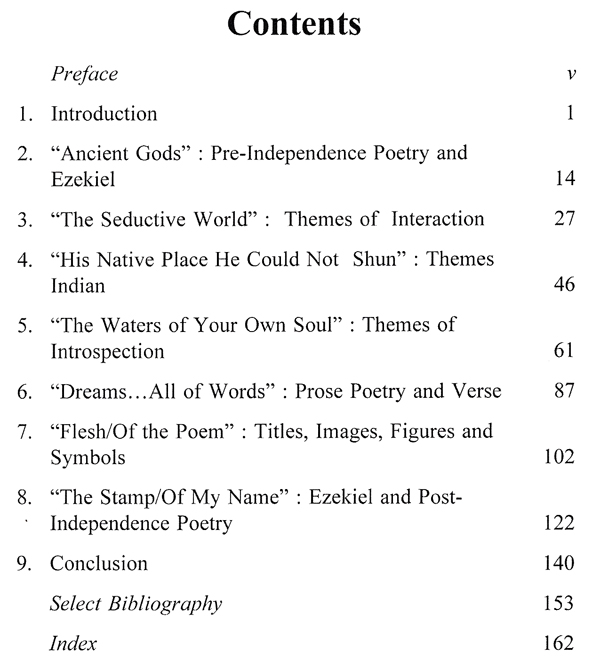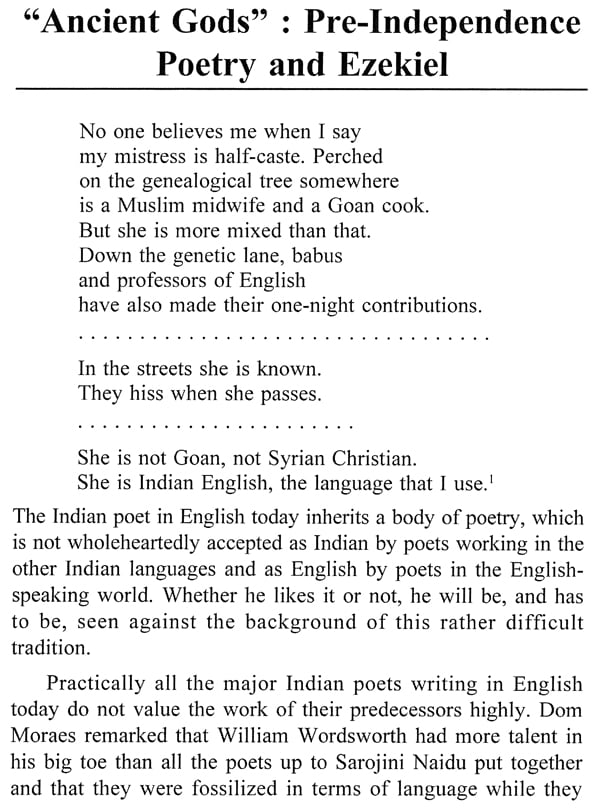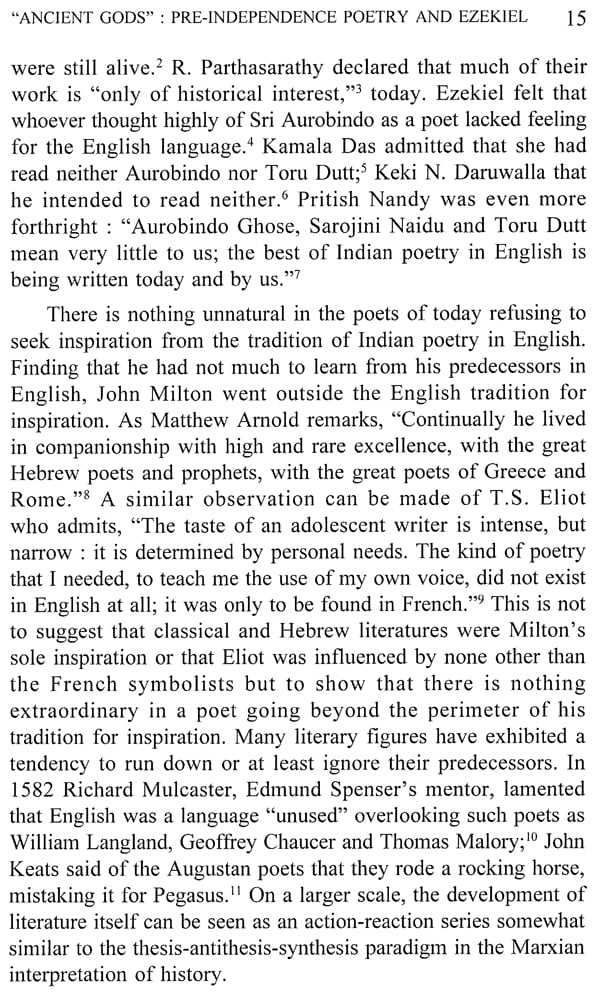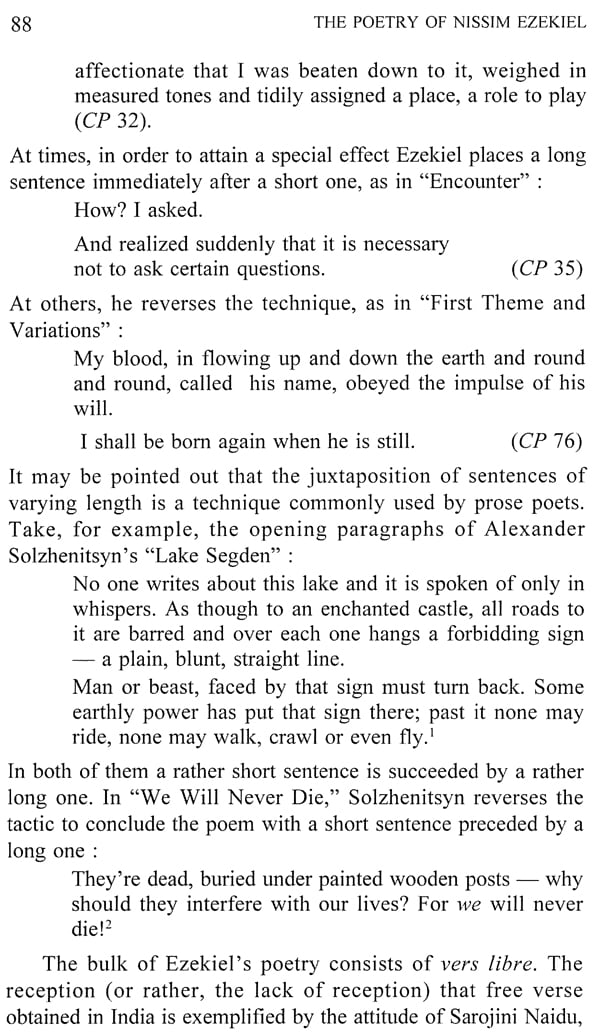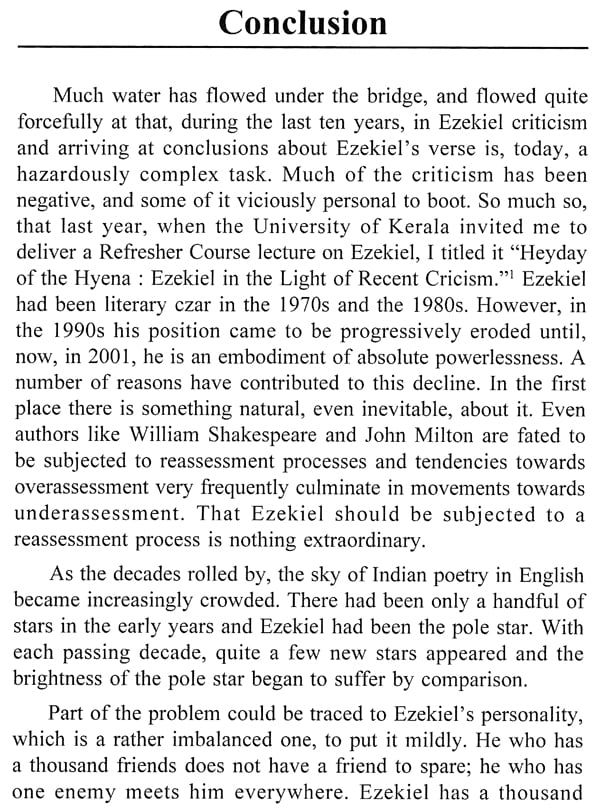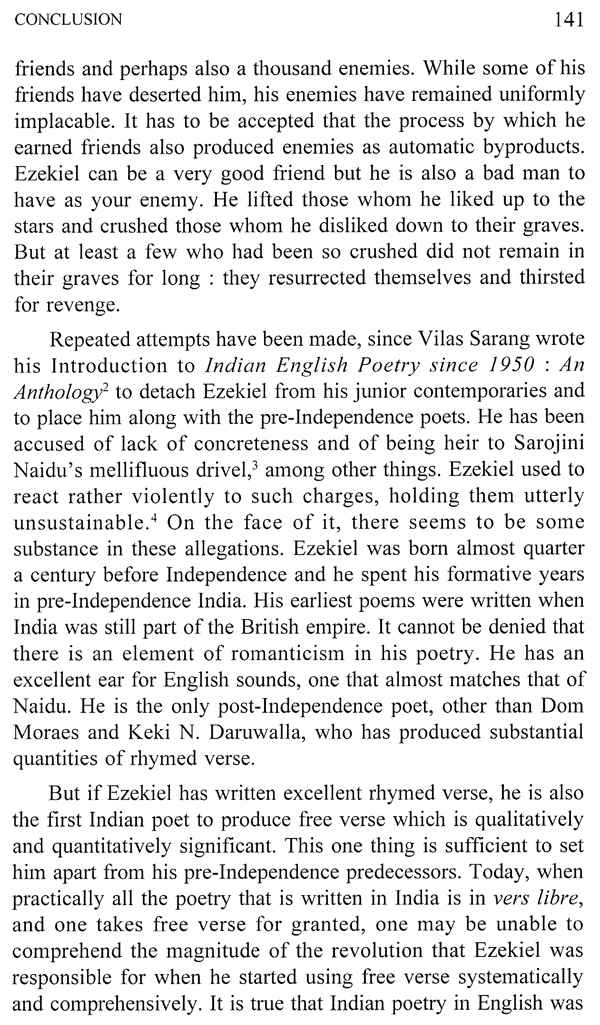
The Poetry of Nissim Ezekiel
Book Specification
| Item Code: | NAS518 |
| Author: | Nissim Ezekiel |
| Publisher: | Atlantic Publishers and Distributors Pvt. Ltd. |
| Language: | English |
| Edition: | 209 |
| ISBN: | 9788126900862 |
| Pages: | 180 |
| Cover: | HARDCOVER |
| Other Details | 8.50 X 5.50 inch |
| Weight | 350 gm |
Book Description
Nissim Ezekiel is one of the most famous Indian poets in English. Displaying a dedication of heroic dimensions to his vocation, he has created an oeuvre remarkable for its range and depth. He was responsible for spearheading the modernist revolution in Indian poetry in English. All but divorcing his wife, denying his family time and commitment, creating and fighting enemies, Ezekiel has served the muse indefatigably and evangelically, and at great personal cost, for he is much activist for poetry as a poet. He has published the work of others, edited journals, held offices in literary organizations, selected poetry for magazines, advised publishing houses and helped and guided generations of poets. Besides, Ezekiel has made significant contributions as playwright, prose writer, critic, translator and teacher.
The Poetry of Nissim Ezekiel is a product of A.Raghu's close familiarity with the work of the poet as well as his long interaction with the man. The book carries out a thorough thematic and stylistic analysis of the corpus of Ezekiel, seeking to effect a comprehensive assessment of the same. Efforts have been made to foreground the corpus against the tradition of Indian poetry in English and to establish the work of Ezekiel as the main link between pre-Independence Indian poetry in English and its post-Independence counterpart. Ever willing to battle it out, Raghu takes on some of the biggest names in the contemporary literary world of India to craft a book which is provocatively brilliant. The Poetry of Nissim Ezekiel will remain the book on Ezekiel's verse for a very long time to come.
A. Raghu joined Thangal Kunju Musaliar College of Arts and Science, Quilon as Lecturer in English in 1990. He became Senior Lecturer in English in 1995 and Reader in English in 1999. He has served as Resource Person at the Institute of English of the University of Kerala and at the Centre for English Language Teaching of the same university. He has lectured at the academic staff colleges of various universities and is the author of First Harvest (1993); CP: A Short Biography (1998) and Second Crop.
In "Waking," Nissim Ezekiel says that the theme of the poem is never an accident. It has its ancestry stubborn in the blood and brain. Something similar can be said of the theme of this study.
Ezekiel was the first contemporary Indian poet in English I read. I remember coming across his poems in The Illustrated Weekly of India as a child who had hardly begun to read. Some years later, I sent some of my own poems to Ezekiel, then Assistant Editor of The Indian P.E.N. I received a very encouraging letter from him in which he advised me to go on writing poetry. It is a letter which I treasure to this day. The first thing I did on arriving in Bombay for the first time was to ask to be taken to Ezekiel.
I have been in touch with him since then. When I look back, I realize how kind he has been to me all these years. He has gone through my poems, published some of them, given me advice, sent me copies of his works and answered my questions. When the time came for me to select a subject for my doctoral research, Ezekiel appeared the inevitable choice. My guide, Dr. K. Radha, Professor and Head, Institute of English, University of Kerala agreed with me. No research scholar ever had a more loving and supportive guide and this study has had the benefit of her kind attention at every stage of its preparation.
In The Revenger's Tragedy, Cyril Tourneur - or is it John Middleton? - asks,
Are lordships sold to maintain ladyships
For the poor benefit of a bewildering minute?
T.S. Eliot has observed that you cannot really criticize an author to whom you have not surrendered yourself. It is the bewildering minute that matters. He explains that the critical process comprises three stages. You give yourself up. Then you recover yourself. At the final stage you find you have something to say. Whatever else may or may not be said of this study, there is no doubt that Ezekiel is a poet to whom I gave myself up.
When I set eyes on Nissim Ezekiel for the first time - I think it was in 1974 - he had more or less assumed the crown of the cultural czar of Indian poetry in English.' Tall and fair and handsome, he appeared to me a god-like figure. He wore gold-rimmed glasses, dark trousers and matching pastel bush shirts or kurtas. He was always casually dressed, and as the years went by, even shabbily dressed. But was his carelessness, a product of extreme care? Was he dressing to kill, in his own way? Was he making use of the trick of singularity? For he always desired to be a standout and always managed to do so. The overall effect of his rather romantically unkempt appearance was to enhance the attractiveness of his personality, at least in the eyes of admirers like me.
Despite his being cultural czar, I found him very approachable. Later, I understood that he saw the task of guiding younger poets, even of boys like me who had dreams of becoming poets, as one of his missions. If he felt that an individual deserved encouragement, there would be hardly anything he would not do for him or her. In fact it seemed to me that he was, in general, more enthusiastic about helping women than men. My impression is shared by many others who have interacted with him. In the recent biography of Ezekiel, R. Raj Rao calls him a ladies' man.2 Ezekiel cannot be called a womanizer in the uglier sense of the term. But he certainly did have romantic relationships with quite a number of women down the decades. While at Wilson College, Ezekiel had been the male student most chased by girls. In 1988-1989, as an old man in his mid-sixties, Ezekiel spent some months in Singapore as poet-in-residence at the National University of Singapore. He became a real hit among the students, especially the girls - the students, of a school where he conducted a poetry reading submitted a petition demanding the inclusion of more poetry in the syllabus - and collected yet another bevy of female admirers, this time mostly slit-eyed ones. One of them was Lin Hsin Hsin who wrote a "poem" which contains the following lines :
Professor Ezekiel
you're one of the many few
to whom I owe my gratitude
you've a heart to heal
may be, you never knew.
Professor Ezekiel your words
in my heart are retained
your lines
in my mind they refrain' [sic]
If there was one woman with whom, one can state with certainty, that Ezekiel did not have a romantic relationship; it was his wife, Daisy Ezekiel nee Dandekar. Was Daisy's inability to respond to Ezekiel's emotional needs responsible for pushing him into extramarital relationships? Or were these relationships responsible for throwing Ezekiel and his wife apart? It is something of a chicken and egg situation. Perhaps Ezekiel's extramarital relationships were not the sole reason, not even the overriding reason, for the break-up of his marriage. Daisy probably would have swallowed them, and even his habit of flaunting his girlfriends in public, had he been a more attentive, considerate and responsible husband. He sometimes called his marriage a semi-love marriage. It would be far more accurate to call it a semi-arranged marriage. The proposal came from a community matchmaker. Daisy's father sought Ezekiel's mother's permission to introduce her to him. There wasn't much of a courtship. If one can be sure of anything, it was that Ezekiel was not swept off his feet by his feelings for Daisy. And Ezekiel was a man who found himself repeatedly swept off his feet by his feelings of women. The marriage ended in separation. Had he led a more normal married life which would have compelled him to spend more time on his family and less on his literary (and other) pursuits, it is doubtful whether he would have become the Nissim Ezekiel as he is now.
Alexander Pope would probably never have become the bitter and brilliant satirist he became, had he not been born a Catholic in late seventeenth century England. In a somewhat comparable manner, it can be said that it is doubtful whether Ezekiel would have become the poet as he is, had he not been positioned in the rather unique social, religious and cultural slot of life by his birth into a Bene-Israel family in India. William Faulkner has said that in order to know what it is like to be a Southerner one has to be a Southerner.' Similarly, it is difficult for a member of a religious or linguistic majority to fully comprehend the peculiar functioning of the minority psyche. The Constitution of the country says that India is a secular nation where minorities are provided with special protection. But neither Constitutional safeguards nor even the appropriate majority attitudes can fully erase the sense of alienation that is innate to the minority psyche. In India this sense of alienation is perhaps heightened by the presence of a strongly religious core at the center of life. Swami Vivekananda's observation, "To the other nations of the world, religion is one among the many occupations of life.... But here, in India, religion is the one and the only occupation of life,' is only the exaggeration of a vital truth. The Jewish community in India is one of the most microscopic religious minorities in the country. The outsider consciousness which Ezekiel's birth into it provided him with seems to have aided the sharpening of his powers of observation and the strengthening of his sense of awareness.
His family background, which is highly academic, seems to have exerted considerable influence on Ezekiel, himself an academic, and his work. The didactic element in Ezekiel, both man and poet, cannot be identified in a sharper way than as has been by Gieve Patel :
He has taught at school, at college, at the university. When he conducts programmes on art appreciation for Bombay television, he teaches. When he sits in his dusty office at the Indian P.E.N. as its most active office bearer, reading quantities of other people's poems and giving his comments on them - thereby earning lifelong friends and enemies -he is teaching, again. When he writes his poetry, he teaches, this time largely himself.
Interestingly, and perhaps also intriguingly, many of the leading poets of today have specialized in English as an academic discipline. They include Shiv K. Kumar, P. Lal, A.K. Ramanujan, R. Parthasarathy, Keki N. Daruwalla, Dom Moraes, G.S. Sharat Chandra, Eunice de Souza, Adil Jussawalla, Gauri Deshpande, Saleem Peeradina, Arvind Krishna Mehrotra and Santan Rodrigues. All of them with the exception of Daruwalla, Moraes and Rodrigues are, or have been, teachers of English. Kumar, Ramanujan, Daruwalla, de Souza and Deshpande are children of teachers. Great scholars need not always be great teachers - in fact, frequently they are not - but in order to be a great teacher, you have to be at least a good scholar and Ezekiel is surely one. It is doubtful whether he could be called a scholar of the highest order. He lacks the infinite patience, the rigorous discipline and the capacity for systematic work that are essential components of scholarship of the highest order. He never took his doctoral degree. The very thought of wading through a thesis running into hundred of pages, correcting and proofing the successive drafts appears to have made him sick. His intelligence is too much that of a creative person, operating on the principles of the inventor's paralogy rather than those of expert's homology. He is extremely well read in the areas of his specialization like American literature and Anglo-American criticism up to T.S. Eliot and F.R. Leavis. But his total range is somewhat limited. His metalanguage is rather dated.
At the age of eighteen Ezekiel became a Royist. The new humanism preached by M.N. Roy is a unique and somewhat strange blend of idealism and materialism, socialism and liberalism.
**Contents and Sample Pages**
